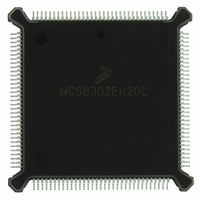MC68302EH20C Freescale Semiconductor, MC68302EH20C Datasheet - Page 37

MC68302EH20C
Manufacturer Part Number
MC68302EH20C
Description
IC MPU MULTI-PROTOCOL 132-PQFP
Manufacturer
Freescale Semiconductor
Datasheets
1.MC68302AG20C.pdf
(4 pages)
2.MC68302AG20C.pdf
(2 pages)
3.MC68302AG20C.pdf
(13 pages)
4.MC68302EH20C.pdf
(481 pages)
Specifications of MC68302EH20C
Processor Type
M683xx 32-Bit
Speed
20MHz
Voltage
5V
Mounting Type
Surface Mount
Package / Case
132-MQFP, 132-PQFP
Family Name
M68000
Device Core
ColdFire
Device Core Size
32b
Frequency (max)
20MHz
Instruction Set Architecture
RISC
Supply Voltage 1 (typ)
5V
Operating Temp Range
0C to 70C
Operating Temperature Classification
Commercial
Mounting
Surface Mount
Pin Count
132
Package Type
PQFP
Lead Free Status / RoHS Status
Lead free / RoHS Compliant
Features
-
Lead Free Status / Rohs Status
Compliant
Available stocks
Company
Part Number
Manufacturer
Quantity
Price
Company:
Part Number:
MC68302EH20C
Manufacturer:
Freescale Semiconductor
Quantity:
10 000
Part Number:
MC68302EH20C
Manufacturer:
FREESCALE
Quantity:
20 000
Company:
Part Number:
MC68302EH20CB1
Manufacturer:
Freescale Semiconductor
Quantity:
10 000
Company:
Part Number:
MC68302EH20CR2
Manufacturer:
Freescale Semiconductor
Quantity:
10 000
- MC68302AG20C PDF datasheet
- MC68302AG20C PDF datasheet #2
- MC68302AG20C PDF datasheet #3
- MC68302EH20C PDF datasheet #4
- Current page: 37 of 481
- Download datasheet (2Mb)
Other bus masters besides the M68000 may also output function codes during their bus cy-
cles. On the MC68302, this capability is provided for each potential internal bus master (i.e.,
the IDMA, SDMA, and DRAM refresh units). Also on the MC68302, provision is made for the
decoding of function codes that are output from external bus masters (e.g., in the chip-select
generation logic).
In computer design, function code information can be used to protect certain portions of the
address map from unauthorized access or even to extend the addressable range beyond
the M68000 16-Mbyte address limit. However, in controller applications, function codes are
used most often as a debugging aid. Furthermore, in many controller applications, the
M68000 stays continuously in the supervisor state.
All exception processing occurs in the supervisor state, regardless of the state of the S bit
when the exception occurs. The bus cycles generated during exception processing are clas-
sified as supervisor references. All stacking operations during exception processing use the
SSP.
The user state is the lower state of privilege. For instruction execution, the user state is de-
termined by the S bit of the SR; if the S bit is negated (low), the processor is executing in-
structions in the user state. Most instructions execute identically in either user state or
supervisor state. However, instructions having important system effects are privileged. User
programs are not permitted to execute the STOP instruction or the RESET instruction. To
ensure that a user program cannot enter the supervisor state except in a controlled manner,
the instructions which modify the entire SR are privileged. To aid in debugging programs to
be used in operating systems, the move-to-user-stack-pointer (MOVE to USP) and move-
from-user-stack-pointer (MOVE from USP) instructions are also privileged.
The supervisor state is the highest state of privilege. For instruction execution, the supervi-
sor state is determined by the S bit of the SR; if the S bit is asserted (high), the processor is
in the supervisor state. The bus cycles generated by instructions executed in the supervisor
state are classified as supervisor references. While the processor is in the supervisor privi-
lege state, those instructions using either the system stack pointer implicitly or address reg-
ister seven explicitly access the SSP.
MOTOROLA
* This is the function code output for the M68000 interrupt
acknowledge cycle.
FC2
Function Code Output
1
0
0
0
1
1
1
1
Table 2-4. M68000 Address Spaces
FC1
0
0
1
1
0
0
1
1
MC68302 USER’S MANUAL
FC0
0
1
0
1
0
1
0
1
Supervisor Program
Reference Class
Supervisor Data
User Program
(Unassigned)
(Unassigned)
(Unassigned)
CPU Space
User Data
*
MC68000/MC68008 Core
2-7
Related parts for MC68302EH20C
Image
Part Number
Description
Manufacturer
Datasheet
Request
R
Part Number:
Description:
Manufacturer:
Freescale Semiconductor, Inc
Datasheet:

Part Number:
Description:
MC68302 Configuring the Chip Selects on the MC68302
Manufacturer:
Motorola / Freescale Semiconductor

Part Number:
Description:
MC68302 Design Concept - Expanding Interrupts on the MC68302
Manufacturer:
Motorola / Freescale Semiconductor

Part Number:
Description:
MC68302 MC68302 Adapting a WAN Controller to a LAN Environment
Manufacturer:
Motorola / Freescale Semiconductor

Part Number:
Description:
MC68302 EKB Applications - Power Measurements on the MC68302
Manufacturer:
Motorola / Freescale Semiconductor

Part Number:
Description:
MC68302 Interfacing the MC68020 to a Slave MC68302
Manufacturer:
Motorola / Freescale Semiconductor

Part Number:
Description:
MC68302 MC68302 Software Performance
Manufacturer:
Motorola / Freescale Semiconductor

Part Number:
Description:
MC68302 Evaluating EDX on the ADS302
Manufacturer:
Motorola / Freescale Semiconductor

Part Number:
Description:
MC68302 Design Advisory #1 - MC68SC302 Passive ISDN Protocol Engine
Manufacturer:
Motorola / Freescale Semiconductor

Part Number:
Description:
MC68302, MC68360, and MPC860 Characteristics and Design Notes for Crystal Feedback Oscillators
Manufacturer:
Motorola / Freescale Semiconductor
Part Number:
Description:
Mc68302 Integrated Multi-protocol Processor
Manufacturer:
Freescale Semiconductor, Inc
Datasheet:
Part Number:
Description:
Manufacturer:
Freescale Semiconductor, Inc
Datasheet:
Part Number:
Description:
Manufacturer:
Freescale Semiconductor, Inc
Datasheet:
Part Number:
Description:
Manufacturer:
Freescale Semiconductor, Inc
Datasheet:
Part Number:
Description:
Manufacturer:
Freescale Semiconductor, Inc
Datasheet:











